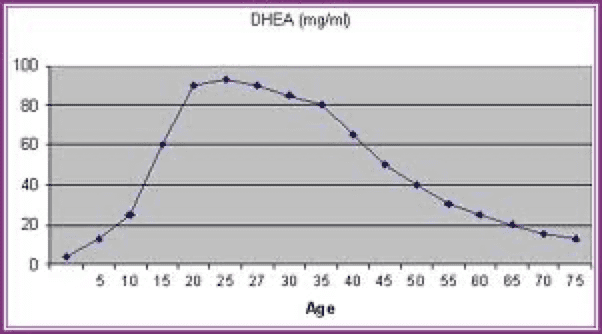By Stephen Cherniske, M.S.
Key Terms
Metabolism: The interplay of chemical reactions that determine how energy is created, stored and used.
Anabolic: Metabolic processes leading to growth and repair.
DHEA (dehydroepiandrosterone): An anabolic hormone
produced mainly by the adrenal glands and brain.
Key Points
- DHEA is the most comprehensive repair signal in human physiology. It initiates and drives repair activity throughout the body and brain.
- DHEA levels start to decline after age 30, resulting in the accumulation of damage associated with the aging process.
- Low levels of DHEA are associated with fatigue, depression, poor exercise tolerance, impaired immunity, obesity and increased risk for diabetes and cardiovascular disease. Here is a chart showing how DHEA levels peak between 18 and 28 years of age (the prime of life), falling slightly from 28 to 35, then declining at a steeper rate, until at age 70, most people are producing only 10 to 15% of the DHEA they enjoyed in their prime.

- Restoring youthful levels of DHEA is easy. DHEA can be applied topically or ingested orally. Dozens of human clinical trials have been conducted using capsules providing 10 to 50 mg per day. What’s more, your DHEA status can be measured by routine blood testing. Simply instruct your doctor to include serum DHEA sulfate (DHEAS) in your annual physical exam, or purchase a test on your own at: anylabtestnow.com.
Supplementing with DHEA: What it can and cannot do.
While DHEA is an anabolic (build, repair, rejuvenate) hormone, it will not cause abnormal muscle growth. Nor will it make you jump higher, run faster or lift heavier weights. In other words, DHEA is not a performance-enhancing drug. It can, however, help to maintain muscle mass in men and women over 35. Other anti-aging effects of DHEA include:
- Maintenance of bone density in women >30
- Comprehensive immune support
- Neuroprotection (protects the brain)
- Mood support (Promotes resilience and confidence)
FAQ’s
- Why is DHEA banned by the NCAA, USOC and professional sports agencies?
Answer: Because of confusion. A small amount of DHEA can be converted to Testosterone and some of that can in turn be converted to estrogens. So the knee-jerk reaction is to ban the substance, when in FACT, this conversion has been shown to be remarkably beneficial, in terms of repair and rejuvenate activity for men and women >30. - How do you know the right dose?
Answer: Health professionals recommend starting with a low dose: 15 mg for women and 25 mg for men. After a few weeks, women can experiment with 30 mg and men can try 50 mg/day. The majority of human clinical trials have used 50 mg per day. Importantly, research supports an optimum blood level for both men and women. DHEA is stored in the body as DHEA sulfate (DHEAS) and this can be measured on an annual basis, just as you keep track of your blood sugar and cholesterol levels. Simply instruct your doctor to include serum DHEAS in your routine blood chemistry or purchase a test on your own at: anylabtestnow.com. Optimum DHEAS for women: 250 – 350 mcg/dL
Optimum DHEAS for men: 350-500 mcg/dL - Can supplementing with DHEA produce adverse side effects?
Answer: In women, too much DHEA can cause irritability, oily skin and acne. Long-term overdose can cause increased facial hair. Importantly, all of these effects are obvious and reversible simply by decreasing the dose. In men, very high doses (>100 mg/d) can cause breast tenderness. NOTE: A 25 year-old will naturally produce about 70-100 mg of DHEA per day. By age 50, that amount may be cut by two-thirds. What we are talking about here is a physiologic dose (ie natural to the body) and side effects at this level are rare. Taking much larger doses (in the range of 100 to 300 mg/day) exceeds the body’s normal metabolism, and is known as a pharmacologic dose. Physicians often use megadose DHEA for specific therapeutic purposes, but you should never do so without professional guidance. - When is the best time to take DHEA supplements?
Answer: Health professionals recommend taking DHEA when you wake up. If you are taking more than one capsule, there is some advantage to splitting the dose between morning and evening. - Who should not take DHEA?
Answer:
A. People under 25 (unless following the advice of their physician)
B. Men being treated for prostate cancer with drugs to block testosterone
C. Women being treated for breast cancer with drugs to block Estrogen
For more information
You can obtain a free download of Stephen Cherniske’s e-book, The Case for DHEA, at FitnessQuest.com. This in-depth review of the medical literature covers every possible objection to the prudent use of DHEA supplements.
About the author
Stephen Cherniske is recognized internationally as a DHEA expert. His books have sold more than 1.5 million copies worldwide, including The DHEA Breakthrough (Random House, 2996), The Metabolic Plan (Random House, 2003) and, together with his wife, Dr Natalie Kather, The Metabolic Makeover (Altea Media, 2014). Cherniske is a patent holder in use of DHEA metabolites as a biomarker of successful aging, and his Congressional testimony in 2004 clearly established DHEA as an anti-aging supplement and not a drug of abuse. He is a former university instructor in Clinical Nutrition, served on the faculty of the American College of Sports Medicine, and was the nutrition trainer for the 1984 US Olympic Track & Field team.
